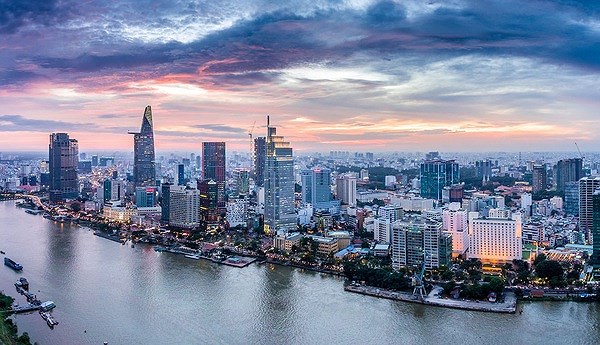 A view of Ho Chi Minh City (Photo: VNA)
A view of Ho Chi Minh City (Photo: VNA) - Strong export
growth and a successful campaign to contain the spread of COVID-19 have
supported Vietnam’s economy through the pandemic and allowed the government to
adopt a restrained fiscal policy response, says Fitch Ratings.
These factors have contributed to
upward pressure on the sovereign’s rating, reflected in its decision to revise Vietnam’s
Outlook to Positive, from Stable, when the agency affirmed the rating at ‘BB’
on April 1.
According to Fitch Ratings, Vietnam’s public
finance metrics have improved markedly relative to peers since the start of the
pandemic. In December 2019, prior to its April 2020 decision to revise the
rating Outlook to Stable from Positive amid uncertainties associated with the
pandemic, Fitch Ratings had expected that Vietnam’s general government (GG)
debt/GDP would stand at 40.3 percent of GDP in 2021, against a median of 41.7
percent for ‘BB’ sovereigns and 43.8 percent for ‘BBB’ sovereigns.
Fitch Ratings now expects Vietnam’s
GG debt/GDP to average around 39 percent in 2021-2022, but the equivalent peer
median forecasts have risen to around 60 percent and 58 percent for ‘BB’ and
‘BBB’ sovereigns, respectively.
The improved fiscal position reflects
Vietnam’s broader economic strength. Tourism earnings have been severely hit by
the pandemic, but other parts of the economy have proved robust. Vietnam was
one of only a few countries globally to post positive economic growth in 2020,
of 2.9 percent. Growth was buoyed by external demand, with goods exports rising
by 6.9 percent. Domestic activity was also supported by the limited spread of COVID-19
in the country.
Fitch Ratings expects growth to remain strong, at
around 7 percent annually, in 2021-2022, buoyed by continued export expansion
and higher investment. A pandemic fiscal package covering 2020-2021, worth
about 292 trillion VND (about 3.6 percent of 2020 GDP), will reinforce growth
prospects.
Goods exports rose by 23.8 percent year-on-year in
the first quarter of 2021, supporting real GDP growth in the quarter of 4.5
percent year-on-year. Vietnam is benefiting from trade diversion, new trade
agreements such as the EU-Vietnam Free Trade Agreement (EVFTA) and the Regional
Comprehensive Economic Partnership (RCEP), and Vietnam’s cost competitiveness.
Rapid increases in public infrastructure investment and FDI should bolster the
sustainability of strong medium-term growth.
Fitch Ratings points out that sustained high
growth that reduces Vietnam’s GDP per capita gap against its peers while
maintaining macroeconomic stability could put upward pressure on the sovereign
rating. Upward pressure could also stem from sustainable fiscal consolidation,
a reduction in contingent sovereign liabilities, or improvements in
banking-sector capitalisation, transparency and regulation./.